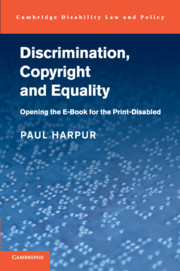Book contents
- Discrimination, Copyright and EqualityOpening the E-Book for the Print-Disabled
- Cambridge Disability Law and Policy Series
- Discrimination, Copyright and Equality
- Copyright page
- Contents
- Foreword
- Acknowledgements
- Introduction
- 1 How Technology Has Created the Possibility of Opening the Book: From Hard Copy to E-Books
- 2 Access to Information Communication Technologies, Universal Design and the New Disability Human Rights Paradigm Introduced by the Convention on the Rights of Persons with Disabilities
- 3 The Weakening of the Exception Paradigm: The World Intellectual Property Organization Changes Path with the Marrakesh Treaty to Facilitate Access to Published Works for Persons Who Are Blind, Visually Impaired, or Otherwise Print Disabled
- 4 The Role of Copyright Laws in Restricting Access to Information and Contributing to the Book Famine
- 5 Exceptions to Rights-Holders’ Exclusivity Provides Limited Relief from the Disabling Impact of Copyright
- 6 Anti-Discrimination Laws Help Protect Persons with Disabilities against Digital Disablement, but Who Qualifies for Protection?
- 7 Causing Digital Disablement Is Not a Trigger for Regulation by Anti-Discrimination Laws: Ignoring Capacity in Favour of Prescribed Relationships
- 8 The Prohibition against Discrimination: Regulating for Equality through Retrofitting Inaccessible Systems
- 9 Introducing Positive Duties in Promoting Equality Outcomes for Persons with Disabilities: The United Kingdom Public Sector Equality Duty Reducing Digital Disablement
- 10 The Right to Digital Equality in Action: Protections under the Canadian Charter of Human Rights and Freedoms and Human Rights Acts
- 11 United States Regulatory Interventions Targeting Disability-Inclusive Digital Environments
- 12 The Enforcement of Legal Duties: Protecting Copyright or Promoting Reading Equality?
- Closing Thoughts and New Options to Reduce Digital Disablement
- Appendix: List of Anti-Discrimination and Civil Rights Laws and Tribunals/Commissions Impacting on Disability in the Federal and State/Province Jurisdictions in Australia, Canada, the United Kingdom and the United States
- Index
4 - The Role of Copyright Laws in Restricting Access to Information and Contributing to the Book Famine
Published online by Cambridge University Press: 01 June 2017
- Discrimination, Copyright and EqualityOpening the E-Book for the Print-Disabled
- Cambridge Disability Law and Policy Series
- Discrimination, Copyright and Equality
- Copyright page
- Contents
- Foreword
- Acknowledgements
- Introduction
- 1 How Technology Has Created the Possibility of Opening the Book: From Hard Copy to E-Books
- 2 Access to Information Communication Technologies, Universal Design and the New Disability Human Rights Paradigm Introduced by the Convention on the Rights of Persons with Disabilities
- 3 The Weakening of the Exception Paradigm: The World Intellectual Property Organization Changes Path with the Marrakesh Treaty to Facilitate Access to Published Works for Persons Who Are Blind, Visually Impaired, or Otherwise Print Disabled
- 4 The Role of Copyright Laws in Restricting Access to Information and Contributing to the Book Famine
- 5 Exceptions to Rights-Holders’ Exclusivity Provides Limited Relief from the Disabling Impact of Copyright
- 6 Anti-Discrimination Laws Help Protect Persons with Disabilities against Digital Disablement, but Who Qualifies for Protection?
- 7 Causing Digital Disablement Is Not a Trigger for Regulation by Anti-Discrimination Laws: Ignoring Capacity in Favour of Prescribed Relationships
- 8 The Prohibition against Discrimination: Regulating for Equality through Retrofitting Inaccessible Systems
- 9 Introducing Positive Duties in Promoting Equality Outcomes for Persons with Disabilities: The United Kingdom Public Sector Equality Duty Reducing Digital Disablement
- 10 The Right to Digital Equality in Action: Protections under the Canadian Charter of Human Rights and Freedoms and Human Rights Acts
- 11 United States Regulatory Interventions Targeting Disability-Inclusive Digital Environments
- 12 The Enforcement of Legal Duties: Protecting Copyright or Promoting Reading Equality?
- Closing Thoughts and New Options to Reduce Digital Disablement
- Appendix: List of Anti-Discrimination and Civil Rights Laws and Tribunals/Commissions Impacting on Disability in the Federal and State/Province Jurisdictions in Australia, Canada, the United Kingdom and the United States
- Index
Summary
- Type
- Chapter
- Information
- Discrimination, Copyright and EqualityOpening the e-Book for the Print-Disabled, pp. 93 - 122Publisher: Cambridge University PressPrint publication year: 2017



